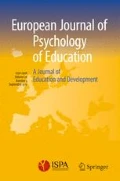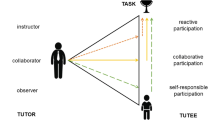Abstract
Our cognitive-motivational process model (Vollmeyer & Rheinberg, 1998) assumes that motivational factors (i.e., mastery confidence, incompetence fear, interest, and challenge) affect performance via mediators. Previous studies (Vollmeyer, Rollett, & Rheinberg, 1997) found that strategy systematicity and motivational state during learning mediate the impact of initial motivation on the learning of a complex system. Potential mediators could be other cognitive (e.g., hypothesis testing) and metacognitive aspects, in that more motivated learners (high mastery confidence, low incompetence fear, high interest) analyse more deeply. Verbal protocols from 44 students who learnt to control a complex dynamic system were collected. We measured their initial motivation (on the four factors specified), then during learning we assessed their strategy systematicity and motivational state. Additionally, we analysed the verbal protocols to obtain indicators of learners’ cognitive and metacognitive processes. Performance measures were levels of knowledge acquisition and application. The cognitive-motivational process model was replicated. Qualitative cognitive aspects were added as mediators, however, the results for metacognition were problematic, partly because participants gave relatively few clearly expressed metacognitive statements.
Résumé
Notre modèle de processus cognitivo-motivationnel (Vollmeyer & Rheinberg, 1998), suppose que les facteurs motivationnels (i.e., confiance dans sa maîtrise, crainte de l’incompétence, intérêt, et défi) affectent la performance par l’intermédiaire de médiateurs. Des études antérieurs (Vollmeyer, Rollett, & Rheinberg, 1997) ont montré que la systématicité de la stratégie et l’état motivationnel pendant l’apprentissage d’un système complexe. Les médiateurs pontentiels peuvent concerner d’autres aspects cognitifs et métacognitifs, étant donné que les apprenants les plus motivés (niveau élevé de confiance dans sa maîtrise, faible crainte de son incompétence, niveau élevé d’intérêt) analysent plus profondément. On a recueilli les protocoles verbaux de 44 étudiants qui apprenaient à contrôler un système dynamique complexe. On a mesuré leur motivation initiale (sur les quatre facteurs spécifiés) puis, durant l’apprentissage, on a évalué leur systématicité stratégique et leur état motivationnel. En plus, on a analysé les protocoles verbaux afin d’obtenir des indicateurs de processus cognitifs et métacognitifs d’apprentisage. Les mesures de performance utilisées ont été des niveaux d’acquisition et d’application de connaissances. On a alors répliqué le modèle de processus cognitivomotivationnel à ces données. Les aspects cognitifs qualitatifs ont été introduits, en plus, comme médiateurs, mais les résultats relatifs à la métacognition ont été problématiques du fait, en partie, que les participants ont fourni relativement peu d’énoncés méta-cognitifs exprimés clairement.
Similar content being viewed by others
References
Abele, A. (1995).Stimmung und Leistung. [Mood and performance] Göttingen: Hogrefe.
Bandura, A., & Wood, R. (1989). Effect of perceived controllability and performance standards on self-regulation of complex decision-making.Journal of Personality and Social Psychology, 56, 805–814.
Bentler, P.M. (1992).EQS: Structural equations program manual. Los Angeles: BMDP.
Bless, H. (1997).Stimmung und Denken [Mood and thinking]. Bern: Huber.
Boekaerts, M. (1996). Personality and the psychology of learning.European Journal of Personality, 10, 377–404.
Burns, B.D., & Vollmeyer, R. (1997). A three-space theory of problem solving. In M.G. Shafto & P. Langley (Eds.),Proceedings of the Nineteenth Annual Conference of the Cognitive Science Society (p. 879). Hillsdale, NJ: Erlbaum.
Cervone, D., Jiwani, N., & Wood, R. (1991). Goal setting and the differential influence of self-regulatory processes on complex decision-making performance.Journal of Personality and Social Psychology, 61, 257–266.
Cohen, J. (1960). A coefficient of agreement for nominal scales.Educational and Psychological Measurement, 20, 37–46.
Davidson, J.E., Deuser, R., & Sternberg, R.J. (1994). The role of metacognition in problem solving. In J. Metcalfe & A.P. Shimamura (Eds.),Metacognition (pp. 207–226). Cambridge, MA: MIT Press.
Deffner, G. (1984).Lautes Denken — Untersuchung zur Qualität eines Datenerhebungsverfahrens [Think aloud — An investigation of the validity of a data-collection procedure]. Frankfurt am Main: Peter Lang.
Dominowski, R.L. (1998). Verbalization and problem solving. In D.J. Hacker, J. Dunlosky, & A.C. Graesser (Eds.),Metacognition in educational theory and practice (pp. 25–45). Mahwah, NJ: Erlbaum.
Efklides A., Papadaki, M., Papantoniou, G., & Kiosseoglou, G. (1997). The effects of cognitive ability and affect on school mathematics performance and feelings of difficulty.American Journal of Psychology, 110, 225–258.
Ericsson, K.A., & Simon, H.A. (1993).Protocol analysis (Rev. ed.), Cambridge, MA: MIT Press.
Flavell, J.H. (1979). Metacognition and cognitive monitoring: A new area of cognitive developmental inquiry.American Psychologist, 34, 906–911.
Funke, J. (1991). Solving complex problems: Exploration and control of complex systems. In R.J. Sternberg & P.A. Frensch (Eds.),Complex problem solving: Principles and mechanisms (pp. 185–222). Hillsdale, NJ: Erlbaum.
Putz-Osterloh, W. (1993). Strategies for knowledge acquisition and transfer of knowledge in dynamic tasks. In G. Strube & K.F. Wender (Eds.),The cognitive psychology of knowledge (pp. 331–350). Amsterdam: Elsevier.
Schooler, J.W., Ohlsson, S., & Brooks, K. (1993). Thoughts beyond words: When language overshadows insight.Journal of Experimental Psychology: General, 122, 166–183.
Schoppek, W. (1997). Wissen bei der Steuerung dynamischer Systeme — ein prozeßorientierter Forschungsansatz (Knowledge in the control of dynamic systems — A process oriented approach).Zeitschrift für Psychologie, 205, 269–295.
Simon, H.A. (1979). Information processing models of psychology.Annual Review of Psychology, 30, 363–396.
Simon, H.A. (1996). Metacognition. In E. De Corte & F.E. Weinert (Eds.),International encyclopedia of developmental and instructional psychology (pp. 436–441). New York: Elsevier.
Vollmeyer, R., & Burns, B.D. (1995).Goal-specificity and hypothesis testing in learning a complex task. Paper presented at the 36th Annual Meeting of the Psychonomic Society in Los Angeles.
Vollmeyer, R., Burns, B.D., & Holyoak, K.J. (1996). The impact of goal specificity on strategy use and the acquisition of problem structure.Cognitive Science, 20, 75–100.
Vollmeyer, R., & Rheinberg, F. (1998). Motivationale Einflüsse auf Erwerb und Anwendung von Wissen in einem computersimulierten System [Motivational influences on the acquisition and application of knowledge in a simulated system].Zeitschrift für Pädagogische Psychologie, 12, 11–23.
Vollmeyer, R., Rollett, W., & Rheinberg, F. (1997). How motivation affects learning. In M.G. Shafto & P. Langley (Eds.),Proceedings of the Nineteenth Annual Conference of the Cognitive Science Society (pp. 796–801). Hillsdale, NJ: Erlbaum.
Vollmeyer, R., Rollett, W., & Rheinberg, F. (1998). Motivation and learning in a complex system. In P. Nenniger, R.S. Jäger, A. Frey, & M. Wosnitza (Eds.),Advances in motivation (pp. 53–67). Landau: Verlag Empirische Pädagogik.
Weinert, F.E. (1984). Metakognition und Motivation als Determinanten der Lernaktivität: Einführung und Überblick [Metacognition and motivation as determinants for learning activity: Introduction and overview]. In F.E. Weinert & R.H. Kluwe (Eds.),Metakognition, Motivation und Lernen [Metacognition, motivation, and learning] (pp. 9–21). Stuttgart: Kohlhammer.
Woodworth, R.S., & Schlosberg, H. (1954).Experimental psychology. New York: Holt, Rinehart, and Winston
Author information
Authors and Affiliations
Corresponding author
Rights and permissions
About this article
Cite this article
Vollmeyer, R., Rheinberg, F. Motivation and metacognition when learning a complex system. Eur J Psychol Educ 14, 541–554 (1999). https://doi.org/10.1007/BF03172978
Received:
Revised:
Issue Date:
DOI: https://doi.org/10.1007/BF03172978




